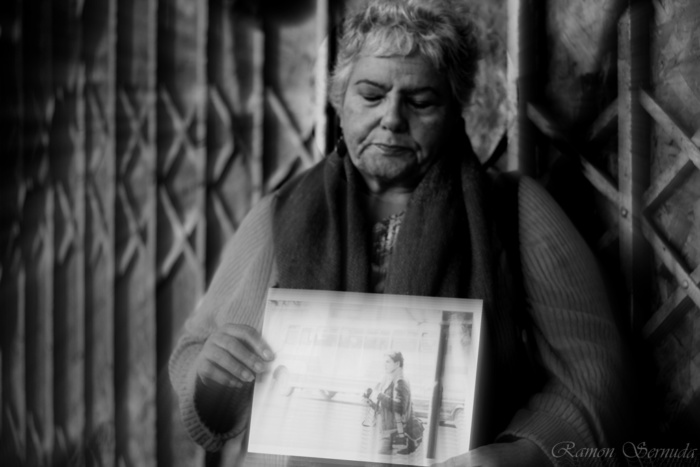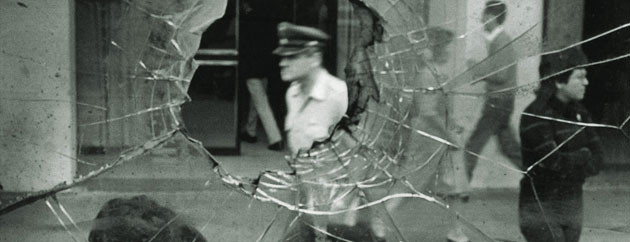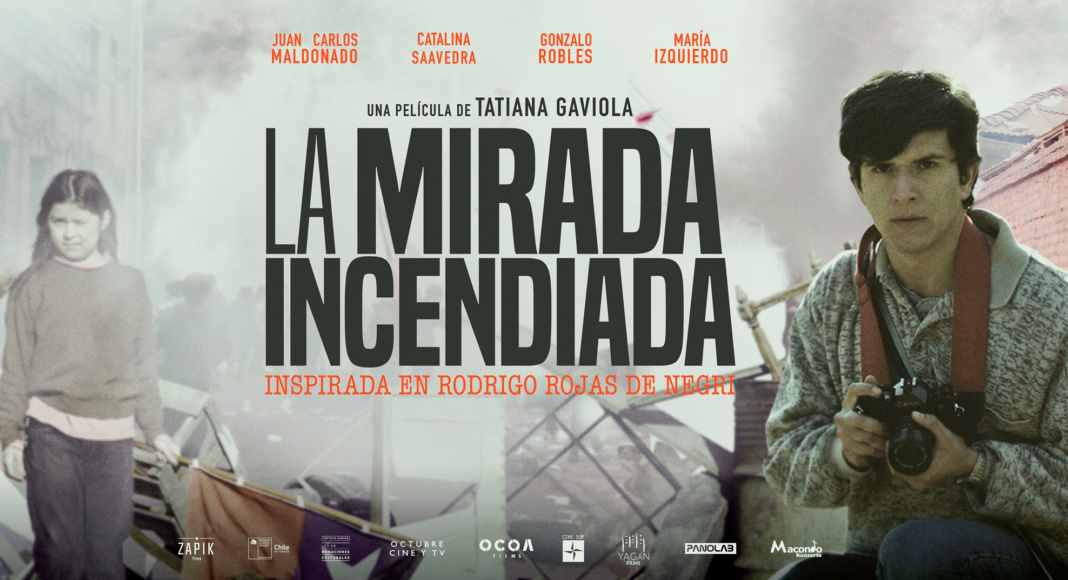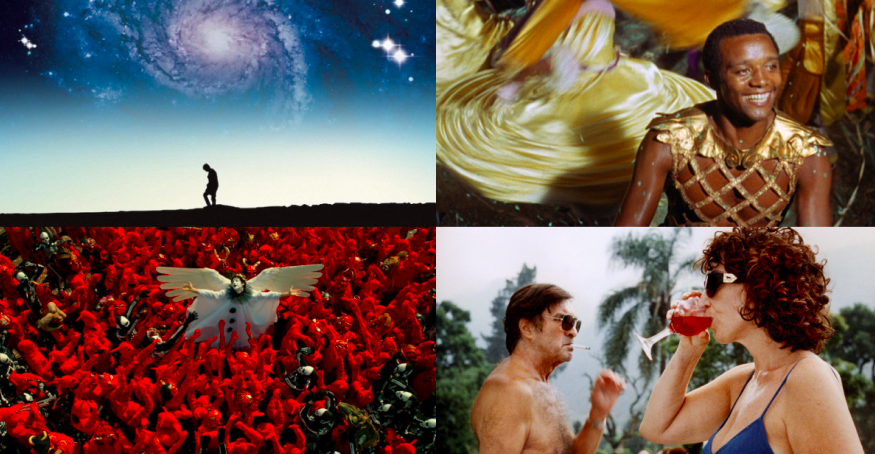La mirada incendiada (The Burning Gaze, 2021), which premiered this month on Chilean film streaming platform PuntoPlay, focuses on a pivotal traumatic event during the Chilean dictatorship. The film attempts to work through recent trauma, yet risks sensationalising a catastrophic event remembered by many Chileans, not least the families of the aggrieved. Sebastián Bustamante – artist, writer, researcher and curator – unpicks some of the controversy around the film and reflects on the difficulties of exploring the dictatorship through cinema. All translations are the author’s own.
On the 2nd July 1986, a military patrol commanded by Captain Fernández Dittus detained two young protesters, Rodrigo Andrés Rojas de Negri – a 19-year-old photographer who recently returned from exile, and Carmen Gloria Quintana – an activist. Rodrigo and Carmen Gloria were beaten, doused in petrol and burned alive. After suffering extensive life-threatening injuries, they were loaded into a military vehicle and left for dead on the city’s outskirts.
Both were discovered by workers and taken to a hospital. Rodrigo had 2nd and 3rd degree burns over 65 percent of his body and Carmen Gloria over 62 percent of hers. Carmen survived with life-changing injuries, but Rodrigo, having inhaled some of the flames, died four days later without receiving sufficient medical attention.
This incident was a stark reminder that the dictatorship, which had been in power since 1973, continued to commit atrocious acts of violence against its citizens. The Caso Quemados (The Case of the Burned Ones) is the subject of a 2021 film, La mirada incendiada (The Burning Gaze, 2021) directed by Tatiana Gaviola and starring Juan Carlos Maldonado, Gonzalo Robles and Catalina Saavedra.
The film begins with Rodrigo’s (Juan Carlos Maldonado) return to Chile from exile in the United States. It narrates his period of readapting to his birth country, and his relationship with both his aunt (Catalia Saavedra) and a fictional camera shop owner, Don Mario (Gonzalo Robles), who employs Rodrigo to take photographs for ID cards. The film narrates the young man’s desire to photograph protests and expose the realities of the brutal dictatorship. It fictionalises Rodrigo’s love interests, lending the film a saccharine romantic element reminiscent of a telenovela.
La mirada incendiada continues a trend in film portrayals of the Chilean civil-military dictatorship (1973-1990). Many depictions attempt to interpret and work through this recent trauma in a country that has so far failed to bring many culprits of human rights violations to justice and where the police force continues to repress citizens. Andrés Wood’s highly acclaimed Machuca (2004), for example, narrates the experience of the dictatorship from a child’s perspective. Events in a private school become a compelling microcosm for social and political divides in Salvador Allende’s short-lived socialist government (1970-1973) which abruptly ends in the film with the military coup on 11th Sept 1973.
Another series of films are Pablo Larraín’s loosely related trilogy: Tony Manero (2008), Post Mortem (2010) and No (2012). The latter film, set during the 1988 plebiscite where Chileans decided not to continue Pinochet’s rule, is the closest to La mirada incendiada as it is based on real historical figures and events unlike Larraín’s first two films. The dictatorship serves as the backdrop for these films’ fictionalised stories of morally corrupt murderous protagonists during a period of extreme state violence.
La mirada incendiada, as the latest representation of the horrors of the dictatorship, is not without controversy. Most pressingly this concerns whether film can be a reliable witness to history, especially in the case of films based on real events and people.
Choosing Carmen Gloria’s (Constanza Sepúlveda) voice to narrate La mirada incendiada does not match her secondary role in the film, only appearing near the end as Rodrigo’s main love interest’s sister. Why she is relegated in the narrative remains unexplained. If it is intended to add ‘authenticity’, it fails to do so as Carmen Gloria and Rodrigo only met a few days before the incident which would connect them forever, and therefore the fictionalised interpretation of Carmen Gloria’s voice is an unreliable witness to Rodrigo’s life.
The starkest critique of the film has come from Rodrigo’s mother, Verónica, who fought tirelessly to achieve justice for her son following his murder and continuously pressured democratic governments following Chile’s transition, to call for accountability and preserve Rodrigo’s legacy. She says she was not consulted on the film’s production and is highly critical of the film.

As dialogue between Verónica and the film’s producers collapsed, the only remaining communication took place through lawyers prior to the film’s release on 8th April 2021. Verónica was allowed to watch the film before it premiered online and, in an interview following the film’s release, suggested that the film was “a huge mockery of historic memory, not only to [my] family, but also to all those lost in the dictatorship.”
What’s more, Rodrigo’s mother criticised the telenovela-styled interpretation of her son’s life and creative license the director, writer and producers took with characters and stories. She suggests that Rodrigo’s depiction is that of an “idiot who has no idea about Chile”. She described her great pain at its release and accused the film’s producers of making “pornography of suffering.”
Another of the most evident issues with the film is the sensationalised depiction of Rodrigo’s brutal murder and Carmen Gloria’s attempted murder by the military patrol. It is an unnecessary excess, given many Chileans have these events marked in their imaginaries as one of the most brutal episodes in the latter phase of the dictatorship. What more does viewing these events on screen provide? The brutality of the scene reaches sensationalist heights in its attempt to force viewers to confront this history and the circumstances of Rodrigo’s death.
The film, in its depiction of Rodrigo Rojas as naïve, runs the risk of portraying the young photographer as a mere victim of the dictatorship, without representing his involvement with The Association of Independent Photographers (AFI). This group challenged prevalent censorship in Chile by photographing protests, strikes and the repression on the streets of Chile. AFI’s photographs were published in the international press and helped to maintain pressure on Pinochet’s regime. The 2006 documentary film La ciudad de los fotógrafos (The Photographers’ City) offers a compelling account of the group. It pays homage to Rodrigo Rojas and other photographers who were instrumental at changing public perception of Pinochet’s dictatorship more accurately.

Although La mirada incendiada has some notable performances, such as Catalina Saavadra playing Rodrigo’s aunt – Saavedra is best known for her seminal performance in La Nana (The Maid, 2010), – the film lacks the nuance needed to merit its celebration as an important contribution to understanding the dictatorship through cinema.
Critics have rightly pointed out that survivors of the event, such as Rodrigo’s family, are still here to tell their side of the story. Ignoring their wishes is a missed opportunity and disrespectful to those most closely affected by this history. Cinema is a means through which audiences can learn about history but not at the expense of truth and the wishes of living relatives of the dictatorship’s dead.
On their return to Chile from exile, folkloric group Illapu wrote and performed an evocative song Para seguir viviendo (1988) in tribute to Rodrigo Rojas. The song ends with the following lines:
The flames are no longer flames
They are falling leaves
And in the middle of those leaves
My voice lives on
My voice lives on
Rodrigo Rojas on fire
Your voice lives on
It is vital that this dark episode in Chilean history is not repeated, and that Rodrigo Rojas’s voice lives on, through his words, his memories and those of his family, and not the telenovela narrativisation of history.
Where to watch the films mentioned:
La mirada incendiada – PuntoPlay (available until April 30)
La ciudad de los fotográfos – Vimeo
Tony Manero – BFI Player
Post Mortem – Amazon
No – Amazon
Machuca – Vimeo
References/further reading:


